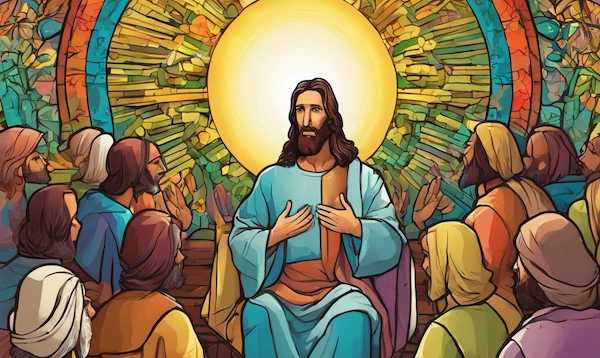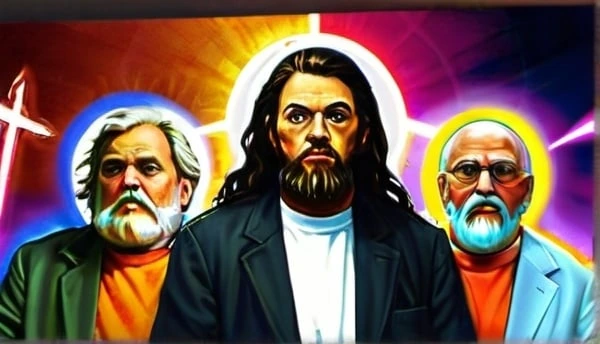
The Earthly World Either Loves or Hates
In the complexity of human existence, the ancient adage “to be in the world but not of the world” evokes mystical and transcendental meanings, offering a lens through which to explore the duality that is typical of earthly life. This expression, extrapolated from a speech by Jesus for which we have a written record thanks to the evangelist John, invites the listener to face worldliness with a spiritual awareness, spurring him or her not to get caught up in earthly needs and desires while maintaining a moral and ethical centering. Let us look in detail at Jesus’ words reported by John:
<<If the world hates you, keep in mind that it hated me first. If you belonged to the world, it would love you as its own. As it is, you do not belong to the world, but I have chosen you out of the world. That is why the world hates you>>.
The Messiah Speaks to Consciousness
Addressing his disciples, Jesus starts by talking about hatred. How is it that a figure regarded as the bearer of compassion and tolerance uses such a strong word?
To understand the meaning of these words, generic in appearance, it is first necessary to enter into an uncommon frame of mind. The Messiah communicated on a spiritual level, addressing the sensitivity of the human soul rather than the mind. The world that Jesus is talking about consists of earthly life as a whole, with all its dichotomies: duality, needs, drives, fears and desires.
Why, then, would Jesus’ followers experience hatred toward them? Because ordinary people, caught up in everyday life and earthly needs, were unable to understand the spiritual significance of the preaching of the Messiah and his apostles, seeing in it only the practical aspect. Jesus asked people to change and be better, as well as to focus on the essentials and avoid being greedy and materialistic. Less spiritually equipped individuals saw this as an insult and a criticism of their lifestyle, believing that such preaching was aimed at changing their way of life for the worse, making them even poorer materially.
Duality Generates Oppositions
This generated discontent, derision and finally anger and hatred toward the messenger, namely Jesus, and his apostles. The human mind is dual, which means that it splits everything into two opposing parts, for example, good and evil, right and wrong, beautiful and ugly, useful and useless. Consequently, the society that we live in, which is nothing but a projection of our mind with its baggage of beliefs and convictions, also ends up categorizing and contrasting everything. The next step after division is that of choice. Which side to choose, then? Almost all human beings, not rarely unaware of it, choose to be on the side of money, success, pursuit of pleasures and so on. Jesus, however, was proclaiming quite different values, and with him were his followers as well. Unfortunately, those who live immersed in duality do not conceive the possibility that other “worlds” may exist, that is, alternatives to the rules and habits passively inherited from society.
Jesus Challenges Earthly Certainties
Derision toward those who propose a different model soon turns into contempt and finally into outright hatred. If there is one thing the dual mind just cannot accept, it is that its “certainties” are questioned. Money, for example, is one of them. Rare are the people who dare to criticize money and its usefulness. At most, there may be some who criticize its unequal distribution within society, but nothing more. Jesus went well beyond that, he was a true spiritual extremist, in fact, he asked his followers to renounce all material possessions, including money. After all, how could a person still bound by work, money and objects, pursue genuine spiritual evolution? To be in the world, or of the world. Duality imposes a choice, and only by choosing the otherworldly path does it become possible to transcend the dualistic aspect of existence. Being of the world imposes choices; being in the world, on the other hand, makes us similar to a traveler who explores and contemplates without, however, giving himself a definite destination. The destination is contemplation itself, that is, recognizing in the world what is already within us. The goal is us.
Jesus Like the Prisoner-Philosopher of Platonic Memory
Something very similar also occurs to the prisoner-philosopher about whom Plato narrates in the so-called “myth of the cave“, well before the arrival of Jesus. The slave chained inside a dark cave, along with others, inexplicably manages to free himself and decides to ascend to the outside world. The encounter with sunlight destabilizes him, as he is used to darkness. Sort of like what happens with the Messiah’s words that disturb listeners unprepared from a conscience perspective. The freed prisoner discovers the existence of another world, the real one, made up of bright colors, trees, flowers, scents and sounds. After recovering from the inner upheaval caused by his encounter with the sun and the real world, he decides to descend back into the cavern to make his companions aware of his astonishing discovery. Unfortunately, things do not go as planned; in fact, the other prisoners do not believe him and begin to mock him. The freed slave insists, provoking anger in the prisoners, who end up beating him to death. The slaves, knowing nothing else and being used to living in chains, simply cannot conceive of a different reality, just as people in Jesus’ time (and still today) could not comprehend the extent of his message.

Belonging to the World, or Just Passing Through It?
Continuing with the interpretation of the Messiah’s words, the next sentence states that the world loves what belongs to it. Indeed, it rewards and praises those who best fit its rules (written and unwritten) and who know how to take advantage of them without thereby challenging or disrupting them. Within this category, of course, fall the false innovators, false prophets, and hypocrites who verbally criticize society but are the first ones to slyly exploit its distortions. The true spiritual seeker, the awakened person, does not behave this way; for this reason, he will never find his place within society; on the contrary, the more he strives to find it, the more frustrating his life will be. The concept that Jesus intended to transmit to his disciples, and to all of us still today, is that we should not be seduced by the illusions of the world, as they will lead nowhere and are, in any case, temporary. Existence, as understood in its totality, is eternal; earthly life, which is part of existence, represents only a moment of it. Those who become overwhelmed by earthly, mundane life, fall prey to a hallucination that distorts the meaning of everything, just as happens to the prisoners in the Platonic cave, hypnotized by the shadows cast on the wall before them, unaware that those shadows are mere projections of real objects. The spiritual (or inner) world is real, the material (or outer) world is a projection, while the duality in which we are immersed seems to do everything to push us into confusing the two.
Jiddu Krishnamurti and the Pathological Adaptation
<<It is no measure of health to be well adjusted to a profoundly sick society>>, so described the world the Indian philosopher Jiddu Krishnamurti. Similarly to Jesus, this thinker, who lived in the 20th century, also emphasized the need to distance oneself from society, focusing rather on one’s moral integrity and soul-searching. If the world seems wrong to us, we do not have to make ourselves comfortable with it and go along with it, hoping thereby to avoid being excluded from social and working life; we can equally develop our own healthier conception of existence and try to live ethically and consciously. We are in the world, with all that it entails: needs, fears, hopes, ambitions, etc. However, we do not have to be of the world, therefore we can process and transform fears, hopes and whatnot into something more morally and spiritually elevated. It seems that human beings are the only creatures on this planet with a conscience, and this should invite us to do some deeper thinking about our true purpose.
Were Jesus’ Words Divisive?
We should now have understood the reasons for the hatred that the person rooted in the world is likely to develop toward the spiritual traveler who is only passing through. Let us now address the last part of Jesus’ discourse, the one that refers to the concept of “choice”. Indeed, the Messiah states that he has personally selected his disciples from among the masses, suggesting that the celestial world is not for everyone. Once again he uses harsh, divisive words: first he speaks of hatred, then he separates people into two categories, the chosen and everyone else. So, why all this dualism? We said that duality belongs to the world, not to the realm of the spirit; how to explain, then, such a divisive attitude?
Spirituality Allows No Compromise
The reason is simple: to shake consciences and to be able to discern true spiritual seekers from all others. What would he have achieved if he had simply talked about compassion, forgiveness and good feelings? Probably nothing. Everyone would have agreed, at least superficially, and nothing would have changed. Just as nothing changes today, yet we hear so many seemingly morally elevated as well as inclusive and tolerant speeches. To stir human beings from their state of mental torpor, something more is needed, and the Messiah knew this well. It is too easy to lavish a few politically correct speeches here and there and then immediately return to one’s comfort zone. As Socrates, a great philosopher and teacher of Plato who lived before the advent of Jesus, used to say: <<Let him who would move the world, first move himself>>.
Fake Spirituality and False Prophets

Jesus, on other occasions, also spoke about false prophets. We believe it is fitting to elaborate on this concept, as it is deeply related to the quote that gives the title to this article. False prophets, or wolves disguised as lambs, are those who in appearance seem to be trying to help people evolve spiritually, but in reality completely belong to the world. <<You will know them by their fruits>>, so the Messiah warned us about such ambiguous and slimy figures. Recognizing them is not always easy, it may take time, but eventually their true nature comes out. They are motivated by personal purposes, not necessarily economic, such as fame, the need to be idolized, and the sense of complacency that comes from exercising power over their followers. They may express interesting and spiritually significant notions, but in the end all their thinking can be summed up in the following concept: you are perfect as you are, the world is wonderful, there is nothing wrong with pursuing materialistic goals as long as you also help others in the process. The function of these people, whether they are aware of it or not, is to gather potential spiritual dissidents and then bring them back into the fold. In our analogy, the sheepfold represents the world, while the false prophets are the shepherds, and the sheep are the spiritual seekers, or more generally, anyone who seeks answers.
The World Doesn’t Change, but We Can
No, it is not all right. If it were, why would some of us feel the need for change?
Jesus did not conclude his speeches in this way at all. As we said earlier, he was extremely divisive and certainly did not sugarcoat. Not surprisingly, he warned us about false prophets, many of whom would speak for him but with entirely different intentions. At this point, it’s useful to make a connection with the thought of the mysterious Hermes Trismegistus, a hermetic figure who has left us important esoteric and metaphysical notions: <<As above, so below>>. What happens in the higher dimensions is reflected in the lower dimensions, and vice versa. Of course, this maxim can also be interpreted in the following way: As inside, so outside. If the outer world is nothing but a reflection of the inner world, then the problem is within us and not outside. Therefore, seeking solutions based on outward projection will lead nowhere. Changing an unjust law makes little sense if deep down we continue to live in duality by constantly dividing everything and everyone into good and bad. The new law, which is better than the old one, will not change the way we are. Returning to Socrates: <<Let him who would move the world, first move himself>>. The rest will come accordingly, we would add.
Being In the World but Not of the World, i.e., Contemplating With Detachment
“Being in the world but not of the world“, a seemingly trivial phrase, yet endowed with timeless spiritual force, spurs us to turn our attention inward, seeking the answers to existential questions in our inner selves. The world is an illusion, a projection of our mind and its fears, hopes, weaknesses and drives. The world exists because we exist and not the other way around. Once this disruptive and enlightening concept is understood, then it becomes possible to embark on a path of inner evolution aimed at making ourselves spectators of the world, observers not overly involved in the illusory show that reproduces itself day after day. In life it is also important to do, to experience, to live firsthand intense and meaningful experiences, whether good or bad. What is crucial is to do so while trying to maintain a detached perspective, as if we were observing ourselves from the outside, so as to avoid identifying too much with the world and its often absurd logic.
A Few Final Tips and Insights
Dissatisfaction and Suffering as Spiritual Propellers
In this excursus, we have seen how Christian wisdom always remains relevant and holds the potential to stimulate the thinking of modern man dissatisfied with earthly life and suffering from the world’s false promises. The Messiah reminds us that we are souls just passing through this world. Jesus’ teachings, as relevant as ever, speak to us about the search for a deeper existence under the banner of transcendence, while proposing that we detach ourselves from the fallen illusions of material reality. The Messiah reminds us that we are passing souls in this world.
The Role of Silence and Solitude
Silence and solitude are essential elements for a deep spiritual life. These practices are not mere relaxation techniques, but true states of being that enable us to get in touch with our inner self and our divine side. Solitude, intended not as isolation but as a sacred space of reflection, empowers the individual to confront his or her inner truths. Silence, rather than the absence of noise, is an active listening that opens the door to a deeper understanding of one’s existence and consciential path. Together, silence and solitude facilitate authentic introspection and constructive dialogue with the divine, allowing one to live a more intentional and conscious life.

The Insights of Eastern Philosophy
For those who want to dive into the varied and complex Eastern philosophy, we suggest starting with an in-depth study of the teachings of Siddhartha Gautama, better known as Buddha. The word buddha literally means “the awakened one” in Sanskrit. He left a legacy of teachings that has shaped entire civilizations. Central to his teachings are the concepts of Dukkha (suffering), Anatta (non-self) and Anicca (impermanence). The Buddha urged his followers to recognize the transitory nature of life and to rid themselves of attachment and desire, which are the true causes of suffering. Through the practice of meditation and the pursuit of the Eightfold Path, he proposed a method to purify the mind and achieve Nirvana, a state of liberation and peace.
Ancient India also produced an incredibly vast and varied philosophical thought, from which we can extrapolate the Upanishads. These ancient texts emphasize the need for spiritual guidance and meditative practice to realize the higher self. Through powerful tools such as OM, the sacred sound that symbolizes the unity of existence, they teach that spiritual realization comes not from erudition, but rather from inner purification and dedication to the higher truth.
The Stoic Way of Life
Another valuable help comes from Stoic philosophy, whose origins can be traced back to the thought of Epicurus, later taken up and reworked by Zeno. Once again, the ancient Greek thinkers could teach us a great deal, if only we were willing to listen. Ancient Latin culture took a lot from that of ancient Greece, which is why we want to focus particularly on the ideas of Seneca, a Stoic philosopher who lived in the 1st century AD and was directly inspired by Epicurus and Zeno. We recommend reading the “Moral letters to Lucilius” (Epistulae morales ad Lucilium), in which Seneca engages in close correspondence with his dear friend Lucilius. Lucilius, completely immersed in the logic of the world, often asks his philosopher friend for advice on what to do, receiving answers that are both enlightening and mind-bending. Reading these letters, through the process of identifying with the two characters, gives an engaging experience both from a literary and contemplative point of view. Lucilius’ questions and Seneca’s answers, although they come from a distant era, remain extremely relevant, since human essence is always the same.
Did you enjoy this article? Did it succeed in resonating with your soul? If so, we are glad it did. You would definitely find our personality tests equally interesting, as they were developed specifically for curious and spiritual people like you.
TAKE THE AWAKENING TEST
TAKE THE AWARENESS TEST
MINI SELF-ASSESSMENT TEST: ARE YOU IN THE WORLD OR OF THE WORLD?
Read the sentences below and select the ones you agree with and that you think make the most sense.
Count the number of boxes checked and read the corresponding profile.
0: Most likely you are passing through IN the world
1-2: One part of you belongs to the world, another part does not
3-4: You almost certainly belong to the world
5-6: You belong to the world, or rather, you are OF the world
MINI SELF-EVALUATION TEST: CAN YOU IDENTIFY A FALSE PROPHET?
Read the following statements and choose those that best represent your way of thinking.
Count the total number of selected boxes and read the corresponding profile.
0-1: You are immunized against false prophets
2-3: You are not totally immune to false prophets
4-5: You are easily captivated by false prophets
6: You are ideal prey for false prophets
